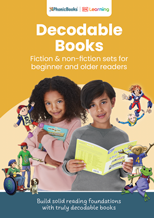In line with the Science of Reading
The principles underlying our books are based on current thinking in the Science of Reading. We believe that almost all students can learn to read and the best way to achieve this is by teaching them how the English writing system works with systematic and structured instruction. Written English is based on an alphabetic code that students need to unlock. For historic reasons, it is complex and needs to be introduced gradually, from simple to complex spellings. Teaching students to recognize these spellings (graphemes) and how to sound them and blend them into words is the route to reading success. Our books and resources develop the five pillars of learning to read: phonemic awareness, phonics, vocabulary, fluency and comprehension. At a later stage, students need to learn about morphemes (units of meaning) to enhance their vocabulary and comprehension.
Systematic Scaffolding
Our books follow a systematic phonics approach. Starting by introducing only a few sounds and letters at a time (Stage 1 introduces only five sounds: s, a, t, i, m), the reader can experience success from the very beginning.
Our books can be used to complement any phonics program once the students have been taught the letters/sounds in the books but follow the progression of the Sounds-Write® Reading and Spelling Program.
Decodable Texts
Once students have been taught letter/sound correspondences, they can practice this new knowledge within controlled decodable texts. This means that students can sound out words that they can’t yet read. Decodable texts encourage students to use ‘blending’ sounds into words as the first strategy when reading, using the phonics he/she has been taught.
Cumulative Progression
Our books have cumulative progression which allows for previous learning to be included as the reader progresses. This ensures that what has been learned is included and practiced along the way.
Reading Practice
Learning a new skill takes a lot of practice so our books for young beginner readers include games to practice reading words in the book. Our catch-up series for older readers offer a ‘reading practice’ page to ensure a successful reading experience of the text in the book.
Vocabulary
Children learn new vocabulary through reading and our books offer an opportunity for this. As they learn to decode a growing number of words, new words are introduced which will help them develop their language skills.
Workbooks
The workbooks are a supplementary resource to support students who need extra practice at each level. Although our books can be used independently, we recommend using the workbooks alongside to enhance and consolidate learning. Some activities precede reading the books such as blending, segmenting and phoneme manipulation, whereas others are directly linked to the books in the corresponding series and are designed to develop reading fluency, spelling, writing and comprehension skills.

